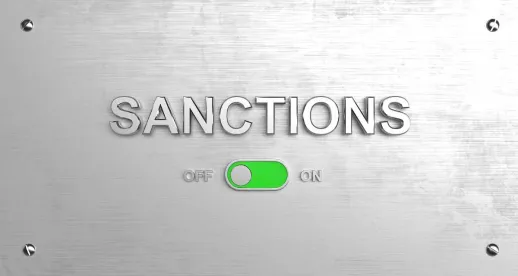The following alert provides an update on recent sanctions developments, including:
- The publication of the UK government’s first sanctions strategy.
- The announcement of over 50 new sanctions.
- Measures to strengthen the Oil Price Cap.
- Recent regulations issued under the Sanctions and Anti-Money Laundering Act 2018 (SAMLA), bringing into force certain new sanctions.
- Renewal of the European Union’s sanctions on Russia and additional clarifications regarding obligations of central securities depositories holding immobilized assets and reserves of the Central Bank of Russia.
- The most recent (13th) package of EU sanctions against Russia.
- Entry into effect of the obligation to include the “no re-export to Russia” clause.
Our lawyers continue to monitor the developments in the UK and EU sanctions regimes.
UK SANCTIONS STRATEGY
On 22 February 2024, the UK government published its first sanctions strategy. The strategy addresses: (a) how the UK uses sanctions to support our foreign and security policy priorities; (b) the partnerships the UK has developed, both within the government and externally with nongovernmental organizations, the private sector, and international bodies, in order to build and deliver a robust sanctions package; (c) the priorities and principles that will shape the use of sanctions in the years ahead; and (d) the steps the government is taking to strengthen sanctions implementation and enforcement and to crack down on those attempting to bypass sanctions.
The strategy sets out the UK government’s commitment to:
- Continue using sanctions to undermine Russia’s ability to fund its war against Ukraine.
- Continue addressing threats through geographic and thematic sanctions regimes.
- Bring forward legislation to introduce a tailored humanitarian “exception” across the UK’s financial sanctions.
- Reinforce sanctions implementation and enforcement by helping UK businesses understand and comply with sanctions and taking a robust approach against noncompliance. To this effect, in December 2023, the Department for Business and Trade announced the creation of a new unit, the Office of Trade Sanctions Implementation (OTSI), that will issue guidance to support businesses in complying with UK trade sanctions and will investigate potential breaches. OTSI will become operational later in 2024.
OVER 50 NEW UK SANCTIONS
Alongside the publication of the sanctions strategy on 22 February 2024, Foreign Secretary David Cameron announced more than 50 new UK sanctions targeting individuals and businesses sustaining Russia’s military campaign.
The announcement sets out newly designated individuals and entities subject to asset freezes and trust services sanctions. Amongst those newly designated are:
- Companies linked to manufacturing munitions;
- Key Russian importers and manufacturers of machine tools;
- Oil trader Niels Troost and his company Paramount Energy & Commodities SA;
- Two diamond companies and Pavel Alekseevich Marinychev, the CEO of the largest state-owned Russian diamond producer; and
- The diamond-related designations supporting the coordinated diamond ban with G7+ partners that came into force on 1 March 2024.
STRENGTHENING THE OIL PRICE CAP
Since Monday, 5 December 2022, the UK has banned the import of both Russian oil and oil products and banned the maritime transportation of Russian oil, bringing the UK’s approach in line with its G7+ coalition partners. Additionally, from the same date, the US$60-per-barrel price cap formulated by the United Kingdom and Price Cap Coalition (the Oil Price Cap) came into effect. Subsequently, since 5 February 2023, the maritime transportation of refined oil products was banned. For further information on the Oil Price Cap and associated measures, see our previous alert here.
On 19 February 2024, the UK and G7+ coalition partners implemented significant changes to the Oil Price Cap attestation model to strengthen the compliance regime and to reduce routes for circumvention. The more stringent requirements will noticeably expand the administrative burdens placed on providers relying on the Oil Price Cap General Licence. They will also increase transparency and frustrate Russia’s efforts to circumvent the Oil Price Cap by reducing opportunities for bad actors to use opaque shipping costs to disguise oil purchased above the cap. Alongside the new requirements, Office of Financial Sanctions Implementation has published revised industry guidance on the Oil Price Cap.
NEW REGULATIONS ISSUED UNDER SAMLA
On 1 January 2024, the Russia (Sanctions) (EU Exit) (Amendment) (No 5) Regulations 2023 (SI 2023/1367) came into force. These regulations prohibit the import, acquisition, supply, or delivery of diamonds and diamond jewelry that are located or originate in, or are consigned from, Russia. The prohibition is universal in that it prohibits the direct or indirect supply or delivery from a place in Russia to any third country.
On 15 December 2023 and 26 December 2023, regulations under the Russia (Sanctions) (EU Exit) (Amendment) (No 4) Regulations 2023 (SI 2023/1364) came into force. Alongside the additional trade restrictions imposed, the regulations also introduce new licensing grounds to support UK entities who wish to divest themselves of their Russian interests fully or partially, introduce new reporting obligations for persons designated under the asset freeze sanctions, and expand the prohibition on UK credit and financial institutions to processing payments in any currency, not just Sterling payments.
RENEWAL OF THE EU'S SANCTIONS ON RUSSIA AND ADDITIONAL CLARIFICATIONS
On 29 January 2024, the Council of the EU (Council) prolonged for another six months, until 31 July 2024, existing EU sanctions targeting specific sectors of the Russian economy, including broad sectoral measures, such as restrictions on trade, finance, technology and dual-use goods, industry, transport, and luxury goods.
On 12 February 2024, the Council adopted measures clarifying the obligations of central securities depositories holding assets and reserves of the Central Bank of Russia that are immobilized due to the European Union’s sanctions. Such central securities depositories that hold more than €1 million of these immobilized assets must account extraordinary cash balances accumulating due to EU restrictive measures separately and must also keep corresponding revenues separate.
13TH PACKAGE OF EU SANCTIONS AGAINST RUSSIA
On 23 February 2024, the Council adopted a thirteenth package of restrictive measures against Russia. The package includes individual listings, by which the Council imposed restrictive measures on an additional 106 individuals and 88 entities, making them subject to travel bans, asset freezes, and prohibition of EU operators from making funds available to them. With the latest round of listings, the EU has in total sanctioned well over 2000 individuals and entities it considers responsible for or involved in the actions undermining or threatening the territorial integrity, sovereignty, and independence of Ukraine.
In terms of export restrictions, the package adds 27 additional companies involved in the development, production, and supply of electronic components (notably used in connection with drone production) to the list of entities associated with Russia’s military-industrial complex or that otherwise support Russia’s defense and security sector. Out of these 27 companies, 17 are Russian and 10 are non-Russian, with four companies registered in China and one registered in Kazakhstan, India, Serbia, Thailand, Sri Lanka, and Turkey, respectively. These entities will be subject to enhanced export restrictions regarding dual-use goods and technology, as well as goods and technology that might contribute to the technological enhancement of Russia’s defense and security sector.
Finally, the package adds components used for the development and production of drones (e.g., electric transformers, static converters, inductors, and aluminium capacitors) to the list of export controlled advanced technology items that may contribute to Russia’s military and technological enhancement or to the development of its defense and security sector.
ENTRY INTO EFFECT OF THE OBLIGATION TO INCLUDE THE “NO RE-EXPORT TO RUSSIA” CLAUSE
As of 20 March 2024, EU exporters are obliged to insert a “no re-export to Russia” clause in their contracts to sell, supply, transfer, or export certain sanctioned products (including, for example, aircraft, spacecraft, jet fuel or fuel additives, firearms, other arms and ammunition, and so-called “common high priority items,” including microchips).
The “no re-export to Russia” clause must prohibit reexport of the relevant goods, technologies, and items to Russia, as well as for use in Russia, and contain adequate remedies in the event of breach.
The clause is not required for contracts to sell, supply, transfer, or export to the USA, Japan, United Kingdom, South Korea, Australia, Canada, New Zealand, Norway, or Switzerland. The requirement applies to all agreements related to dealing with the sanctioned products concluded on or after 19 December 2023; a “no re-export to Russia” clause must have been incorporated in such agreements by 20 March 2024. For agreements concluded before 19 December 2023, the deadline for incorporating the clause is 20 December 2024 or until the agreement expiry date (whichever is earlier).
CONCLUSION
The UK and EU continue to tighten their grip on Russia through the use of constantly evolving economic sanctions. K&L Gates continues to monitor developments in all sanctions regimes, including the United States, the European Union, the United Kingdom, and other territories.
Courtney J. Hunter also contributed to this article.





 />i
/>i

